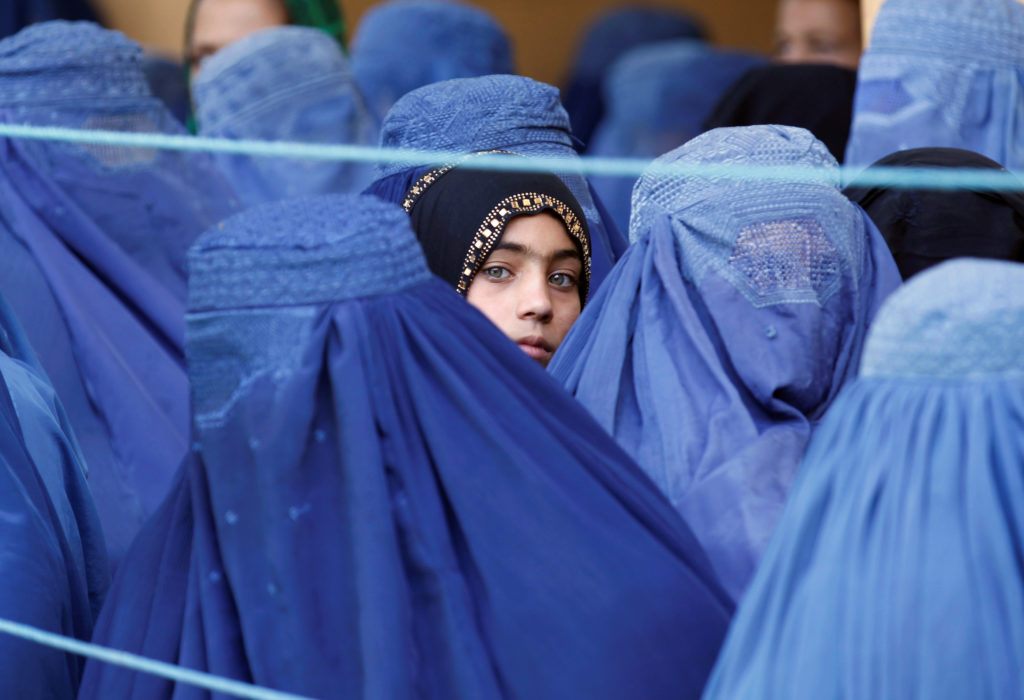By Melina Karaki, Year 12
“A female cat has more rights than a woman in Afghanistan”- is the most suitable description of women’s rights after 3 years of Taliban rule. Since the Taliban regained control in 2021, the 20 years of immense progress regarding women’s rights have been completely erased. Women are once again prohibited from living a normal life, and through the imposition of each new law, are effectively being removed from society.
As the Taliban are gaining more power, their extensive laws regarding freedom of expression are becoming more harsh, greatly limiting the flow of information both within and outside of the country. Hence, it is our job to raise awareness on this matter before we are entirely deprived from accessing the truth.
So, how did it all start?
‘As a girl, I remember my mother wearing miniskirts and taking us to the cinema. My aunt went to university in Kabul.’ says Horia Mosadiq, an Afghan refugee. And she is right; women in Afghanistan were not always as helpless as they are today. At the start of the 20th century, Afghan women had the same amount of rights as the other women around the globe. Actually, Afghan women were given the right to vote in 1920, a year before women in the US had the same ability. They have had access to education since 1921, and in 1964 a constitution was adapted to further support their rights. Until 1996, women were living a pretty normal life, with minimal limitations regarding their behaviour. However, in 1996, a religious group named the `Taliban` came to power. Since the start of their rule, they imposed a harsh version of the Islamic Sharia law: denying women from their right to education and employment. Fortunately, 5 years later, the US led an international military campaign and successfully removed the Taliban from power. With the fall of the Taliban in 2001, great powers (such as the US) were able to assist Afghan women to regain their human rights. A new constitution was adopted that provided equal rights for women. In addition, women were granted a full education, employment opportunities, and a life with no major restrictions. Nevertheless, the persistence of traditional attitudes towards women’s roles in society remained in many provinces in Afghanistan, where men still found ways to limit women’s rights.
During the next 20 years, women’s lifestyle in Afghanistan drastically improved. However, following US military withdrawal from the country in 2021, the Taliban rapidly regained control of Afghanistan and the government in Kabul. Since their regain of power in 2021, they have created complete chaos in the country: both politically and economically. Moreover, their harsh leadership is greatly similar to their Draconian rule in the 1990s, providing evidence that the group has not moderated its approach since its return to power. If anything, their extensive imposition of new laws can be considered as a more harsh approach. Many citizens, especially women, have fled to Pakistan to seek safety. “Since the Taliban took power, I was hiding, and I could not do what I was doing before. There is no future for me and the millions of other women and girls”, says Shamail, an Afghan activist who left the country. “Many of the criminals that we had prosecuted were now in charge of the system. We did not know what the future would be for me and my family.” says Fawzia, a former judge in the Supreme Court of Afghanistan.
So, what is currently happening in Afghanistan?
In short, women have been banned from every aspect of public life; whether it be their social or professional life, women are unable to act freely in almost any situation. “It is like you’re in jail but jail is your home” says Sarah, a teacher who still resides in Afghanistan. Women are forbidden to leave their houses without a male chaperone, and when they do, they are unable to enter amusement parks, gyms, public parks, or even access most public services. The minister of virtue and vice, Mohammed Khaled Hanafi, claims that going to the park for sightseeing is “not obligatory”- “excusing” his decision for the ban. Additionally, Afghan women have been completely stripped from the right to an education, with 1.1 million secondary school aged girls being out of school. In December of 2022, the government extended the ban to universities, and officially prohibited any other form of further education. In regards to their professional life, women have been banned from private jobs, and even NGO´s, greatly reducing the country’s productivity. What’s more, the Taliban closed off all nail salons and parlours, shutting down the last source of relaxation and enjoyment for women.
More recently, Afghan women have been barred from singing, reading, and speaking in public: following the Taliban’s statement that women’s voices should be `concealed` along with their bodies outside their homes. Some provinces have even banned women’s voices from being heard on TV and radio stations, further incentivizing the complete removal of women from society. The Taliban explained that according to their interpretation of the Sharia law, women’s voices are a source of temptation, meaning that they should be heard as minimally as possible. Furthermore, the new Diktat states that women are not allowed to look at men with whom they are not related.
Nevertheless, whatever the reason for the numerous restrictions and laws, this misogynistic treatment can be identified as a form of apartheid: a crime under international law. If you’re not convinced, click here for a complete breakdown of every right that has been stripped away from Afghan women since the reestablishment of the Taliban in 2021.
Moreover, the Taliban rule has resulted in great financial challenges throughout the country, a circumstance especially unfavourable for girls and women, who are not a priority to the government. For instance, nurses have recently been treating more female children, since when food is scarce, families prioritize feeding the boys. Throughout Afghanistan, journalists have encountered various girls who are having a difficult time adapting to these economic conditions. Maryam, a 14 year-old girl, has been forced into an engagement with her landlord’s son in exchange for a well and solar panels, as her family could not find work. Fatima, a 2 year-old girl, has been admitted to the hospital for the third time as her family did not have enough money to buy food.
However, despite the Taliban’s attempt to erase Afghan women from society, the women have still found ways to resist these persistent efforts. From attending secret education courses to organising informal gatherings, Afghan women are doing everything they can to withhold their education and power. On International Women’s Day, March 8th of 2021, former Afghan journalist Hawa launched a radio station in Western Afghanistan. The station, called RadioFemme, is now a source of education for many women throughout Afghanistan. Earlier this year, an Afghan non-profit organisation founded Begum TV, a TV channel which offers 3-hour daily education programmes for women throughout the country. It includes classes in both Dari and Pashto for various grade levels, allowing girls to learn and engage with teachers from their homes. Nina Ibrahimi, a 17 year-old Afghan refugee, created a website through which Afghan girls can publicly share their stories, allowing others to get an unbiased perspective on the occurrences in Afghanistan. Through the algorithm, Afghan women can chat to other women globally, and thus establish any similarities or common interests. In this way, there is a focus on the similarities between the women rather than the differences, aiding the Afghan girls to feel less isolated and secluded. “We have to take the risk”- says Sarah, a teacher of a secret secondary school, urging all Afghan women to continue fighting regardless of the situation.
These acts, although not entirely effective, are profound forms of resistance against the Taliban’s efforts to deny women from their rights and their humanity. They are also evidence of women’s capacities to innovate and take initiative in times of crisis: confuting the stereotype that these characteristics only belong to men.
To conclude, throughout the last century, Afghan women have experienced many periods of promising reforms and many more reversals of progress. Today, they are being treated in a way that is considered to be a crime against humanity. At such times of despair, it is crucial for us to understand our role and importance in society, in order to effectively help those who need it. In this case, it may be difficult, as there is very limited action we can take that will actually help these women. But nevertheless, even if we cannot physically support their situation, we need to educate the people around us so that we can build a promising future that stems far from gender apartheid and misogynistic political policies.
Afghan women have the same capabilities and competences as all other women and men, and it is utterly unjust that they do not have the possibility to develop these qualities. So, I urge you, to use your voice and advocate for them, because they cant.



